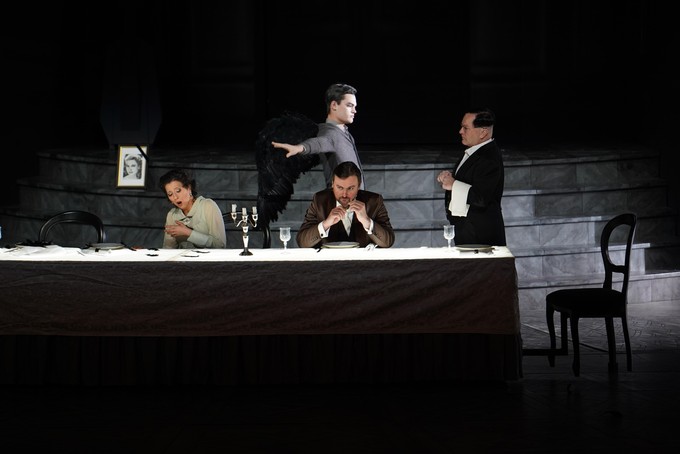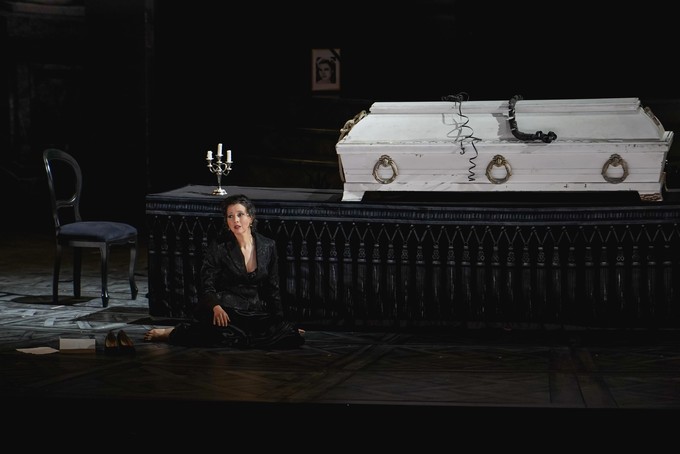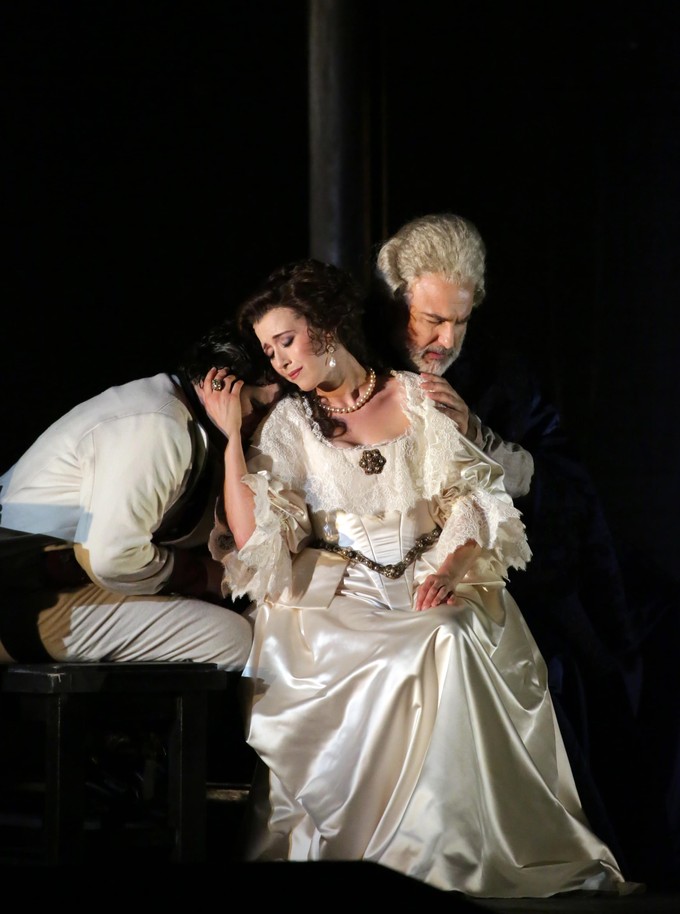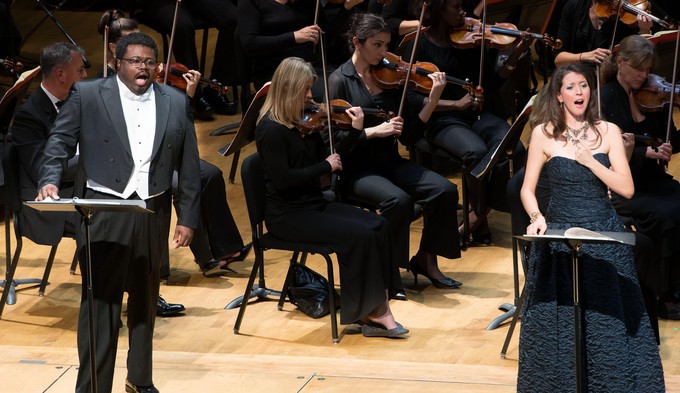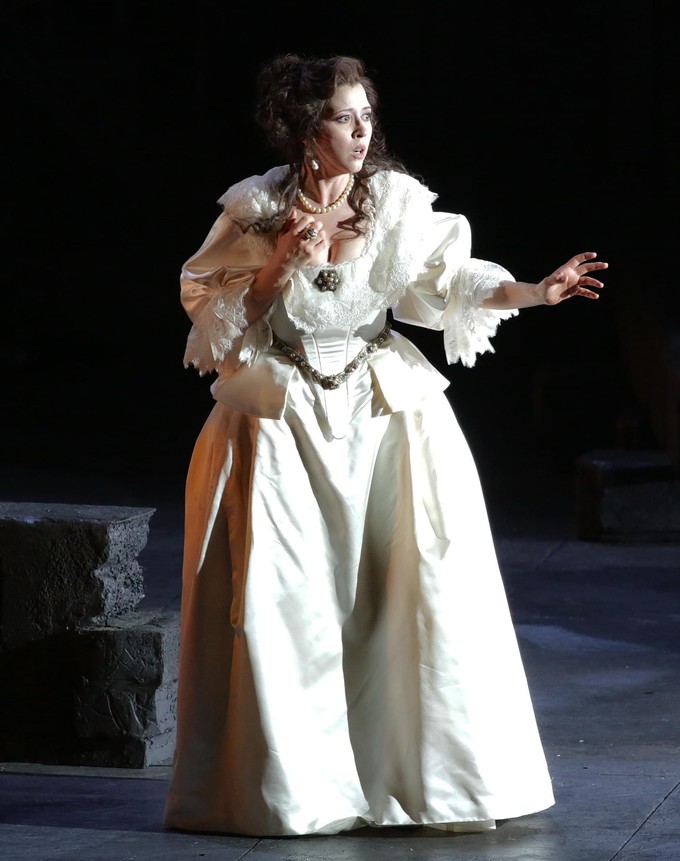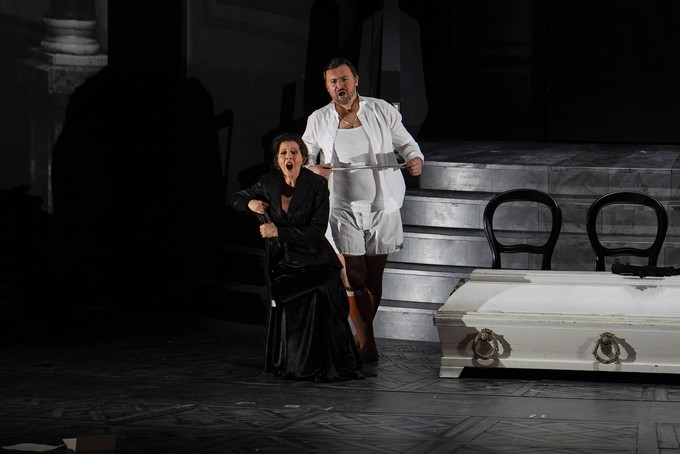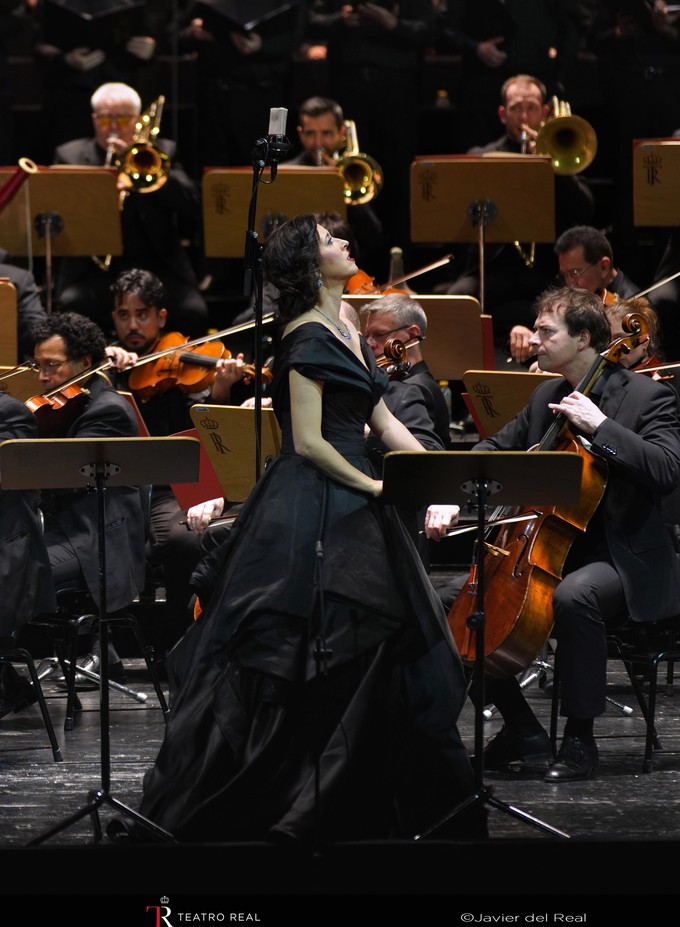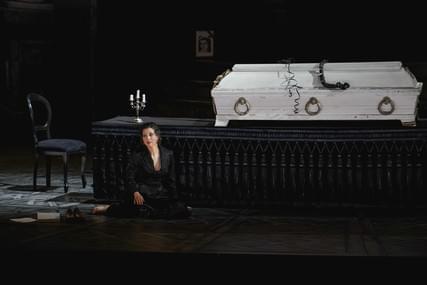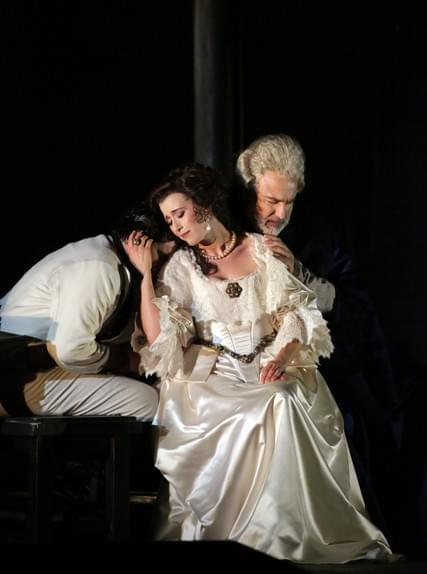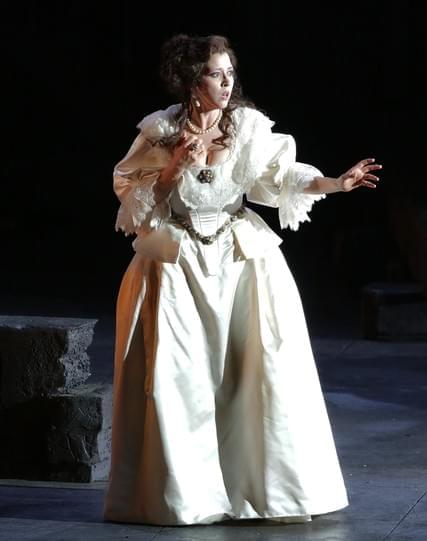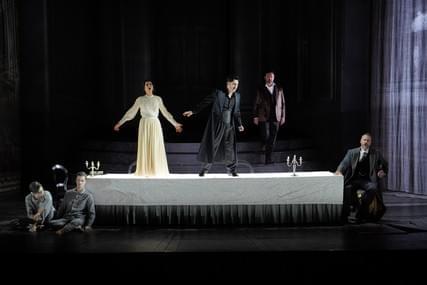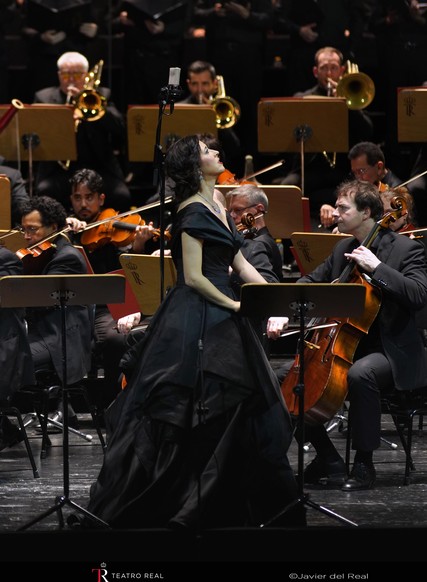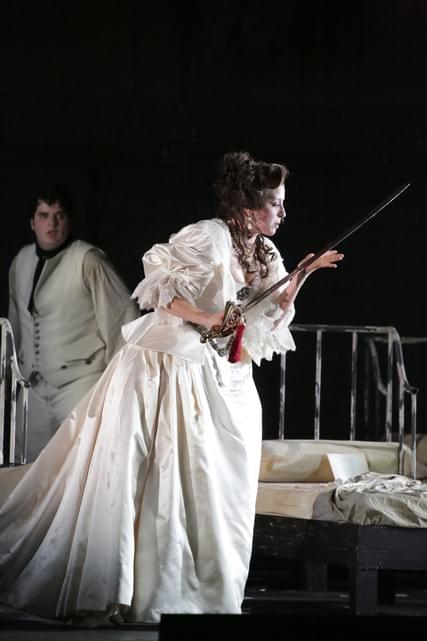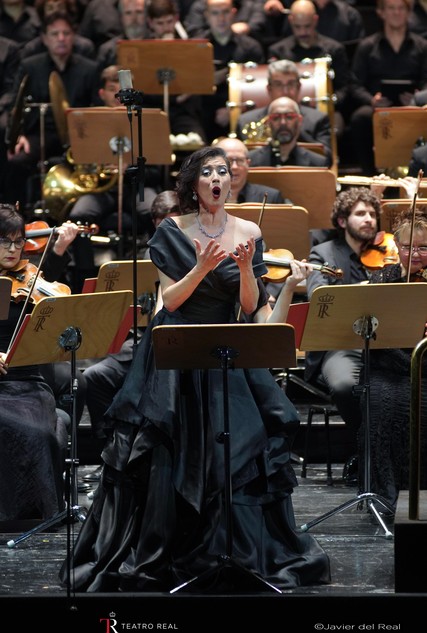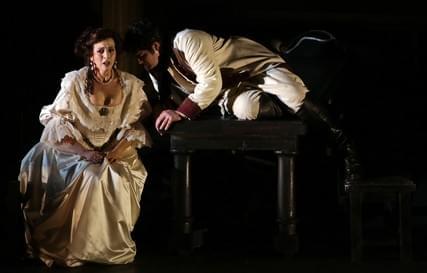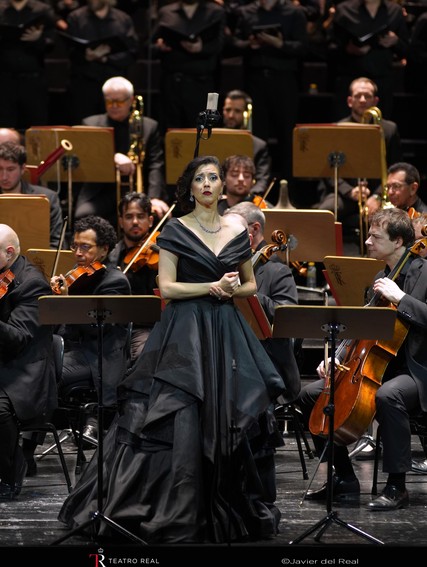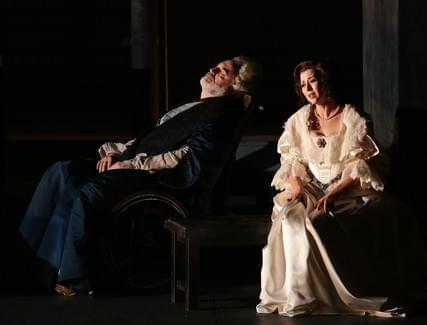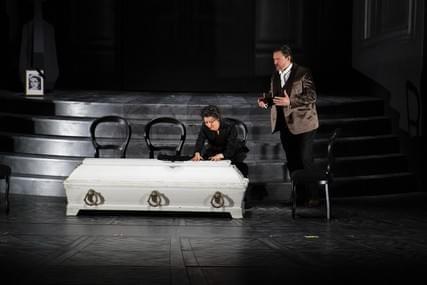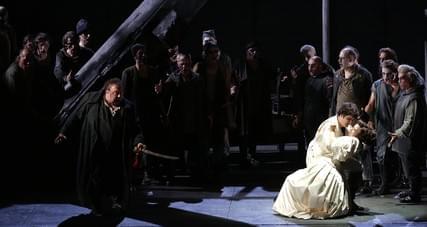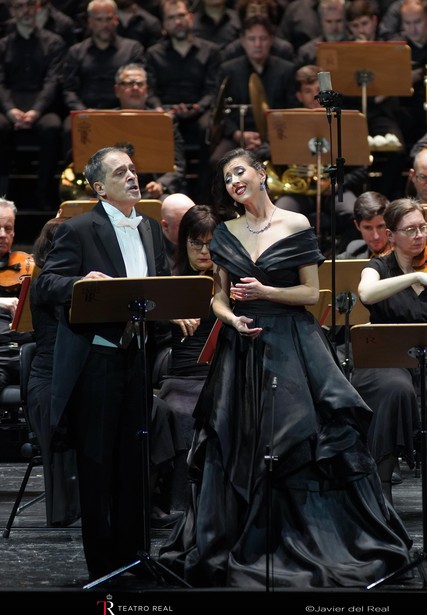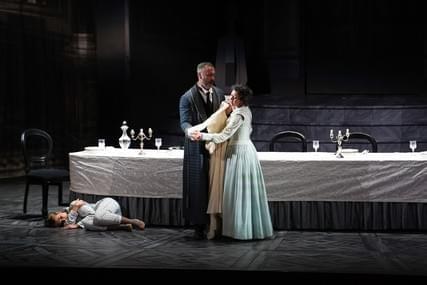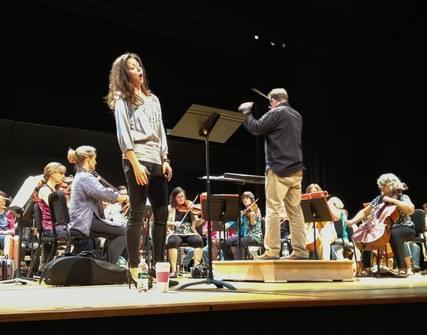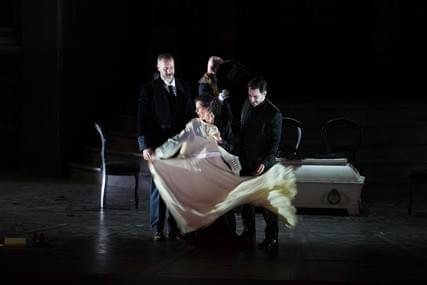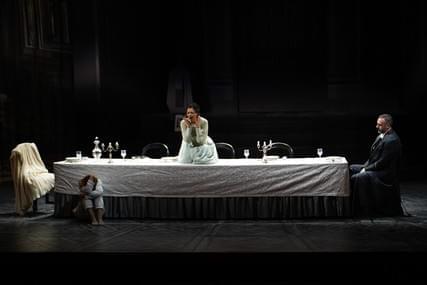Amalia in I Masnadieri
Lisette Oropesa's portrayal of Amalia in various productions has garnered widespread acclaim, with critics repeatedly highlighting her vocal brilliance and technical mastery. Across reviews, a common theme is her ability to balance vocal power with emotional depth, making her performances both technically impressive and profoundly moving. Her interpretation is noted for its emotional authenticity, with critics from Parterre and Platea Magazine emphasizing that her portrayal serves as the emotional anchor of the performances. This emotional resonance is complemented by her technical precision, especially in handling the challenging high registers that are a staple of the role, originally crafted for the renowned soprano Jenny Lind.
What sets Oropesa apart is her skillful navigation of the intricate bel canto style, a feat acknowledged by publications like ResMusica and Wanderer. Her voice is described as powerful yet sensitive, with an ability to convey nuanced emotions through a combination of robust technique and expressive phrasing. Critics from Online Merker and Abendzeitung München praise her for seamlessly integrating the high notes into the musical line, maintaining a sense of continuity and elegance throughout her performance. Her ability to embody the characteristics of Verdi's later female roles, as noted by Abendzeitung München, positions her as a unique and versatile soprano capable of bridging different operatic styles.
Beyond technical prowess, Oropesa brings a traditional yet refreshing interpretation to the role of Amalia, resonating with audiences and critics alike. Reviews from Opera Actual and Mundo Classico commend her for her ability to transport audiences into the vibrant world of bel canto, all while maintaining a feigned fragility that adds a layer of complexity to her character. This combination of vocal mastery, emotional depth, and interpretative skill makes Lisette Oropesa's portrayal of Amalia a notable and compelling contribution to the operatic canon.
Lisette has been reviewed 41 times in this role.
Role Information
- Composer: Giuseppe Verdi
- Opera: I Masnadieri
- Performances: 18
- Reviews: 41
- Venues: 5
- Organizations: 5
- Years: 2013 - 2026
At the production’s molten center, Lisette Oropesa’s Amalia provided both the evening’s most luminous moments and its emotional anchor. The role, originally crafted for Jenny Lind, presents a gauntlet of coloratura obstacles that could easily devolve into vocal Olympics. Oropesa transformed these technical challenges into windows of character revelation. Her voice combines surgical precision with spontaneous emotional combustion, allowing her to…
At the production’s molten center, Lisette Oropesa’s Amalia provided both the evening’s most luminous moments and its emotional anchor. The role, originally crafted for Jenny Lind, presents a gauntlet of coloratura obstacles that could easily devolve into vocal Olympics. Oropesa transformed these technical challenges into windows of character revelation. Her voice combines surgical precision with spontaneous emotional combustion, allowing her to navigate Verdi’s treacherous vocal terrain while maintaining complete dramatic credibility.
Her finest moment arrived when Amalia discovers Carlo’s survival. Oropesa executed a psychological transformation that bordered on genuine madness — not the decorative operatic variety, but something genuinely unhinged that made you question the character’s grasp on reality. Her voice, creamy and fluid, suddenly acquired an almost supernatural fragility that suggested a mind fracturing under impossible pressure. It was the kind of interpretive leap that separates merely excellent singers from true artists.
— Parterre, July 2025
The musical core of this opera is the soprano, a role doubly fulfilled in this cast, as Lisette Oropesa takes on the role of Amalia. Oropesa is one of the increasingly rare representatives of a tradition that is being dangerously abandoned. Listening to her gives the impression of facing one of the great Italian lyric sopranos of the last century.…
The musical core of this opera is the soprano, a role doubly fulfilled in this cast, as Lisette Oropesa takes on the role of Amalia. Oropesa is one of the increasingly rare representatives of a tradition that is being dangerously abandoned. Listening to her gives the impression of facing one of the great Italian lyric sopranos of the last century. In this Amalia, her performance focuses on musicality and the internalization of drama within the melody. Intensity is achieved through concentration rather than expansion. The secret surely lies in her at once sober and highly nuanced articulation. She makes no concessions to acrobatic virtuosity, although she displays agility when necessary. The melodic line and inspired phrasing are clear and rich in nuances. Oropesa's voice, aside from its abundance of harmonics, its naturalness, and its velvety beauty, exerts an irresistible seduction. Her stage presence, always charismatic, grants the character a dignity and credibility without flaws.
— Mundo Classico, February 2023
Lisette Oropesa takes on the role originally created for Jenny Lind (whose bicentenary will undoubtedly be commemorated next year in Sweden). This sole female character proves to be the most attentive of all. Oropesa's Amalia not only wears her heart on her sleeve, but also her breath and palpitations, which become almost physical in a way that evokes the audible…
Lisette Oropesa takes on the role originally created for Jenny Lind (whose bicentenary will undoubtedly be commemorated next year in Sweden). This sole female character proves to be the most attentive of all. Oropesa's Amalia not only wears her heart on her sleeve, but also her breath and palpitations, which become almost physical in a way that evokes the audible gasping of a Violetta or a Gilda. Oropesa knows how to make the most out of the vocal writing: the more her coloraturas and flawless jumps between registers ascend to stratospheric levels, the more her warm and melancholic tone gains in beauty and confidence. When she learns that Carlo is alive, she undergoes a sudden shift in intention, akin to madness, that creates an irresistible moment. The delighted audience unite to reward her, her colleagues and the entire orchestra (who come on stage), with a standing ovation.
— Olyrix, August 2019
Lisette Oropesa stands out as she perfectly embodies the role of Amalia, a character of simple persecution in a Romantic-Verdian key, a woman of fate, temperamental yet unyielding, seeking to change the course of her destiny. Painstakingly adhering to Verdi's dictum, Oropesa proves to be a musician as well as a singer, always maintaining a remarkable stylistic balance between the…
Lisette Oropesa stands out as she perfectly embodies the role of Amalia, a character of simple persecution in a Romantic-Verdian key, a woman of fate, temperamental yet unyielding, seeking to change the course of her destiny. Painstakingly adhering to Verdi's dictum, Oropesa proves to be a musician as well as a singer, always maintaining a remarkable stylistic balance between the lyrical and agile parts, never indulging in overwrought accents. While not powerful in the middle to low register, she has found the right compromise to maintain a uniform and clear vocal delivery.
— Le Salon Musicale, June 2019
The only female role is the Prima interpreter. Amalia is portrayed simply divine by Lisette Oropesa. Her singing is of pure beauty, sensitive, varied, resonant in the depths, partly gently trembling, bell-like in the highs, controlled and highly emotional. The celebrated soprano enriches every scene in which she appears - whether solo, in a duet, quartet, or in harmony with…
The only female role is the Prima interpreter. Amalia is portrayed simply divine by Lisette Oropesa. Her singing is of pure beauty, sensitive, varied, resonant in the depths, partly gently trembling, bell-like in the highs, controlled and highly emotional. The celebrated soprano enriches every scene in which she appears - whether solo, in a duet, quartet, or in harmony with the choir - with an additional luster. Bravissima!
— Online Merker, July 2025
The vocal casting relies on a solid main quartet, dominated by the impressive performance of Lisette Oropesa in her first appearance on the Scala stage. Amalia is a role she knows well, having regularly performed it since her debut in Washington five years ago. Combining both song and presence (a reference to the "Swedish nightingale" for whom the role was…
The vocal casting relies on a solid main quartet, dominated by the impressive performance of Lisette Oropesa in her first appearance on the Scala stage. Amalia is a role she knows well, having regularly performed it since her debut in Washington five years ago. Combining both song and presence (a reference to the "Swedish nightingale" for whom the role was written), she brings a rarely achieved depth to the character of Amalia, both vocally and dramatically, bravely and without disrespect taking on the bel canto component of the role. Her magnificent and pure timbre knows how to harden according to the dramatic demands, her vocal agility impresses in the vocalizations and stratospheric high notes, the singing line seduces with its elegant flexibility.
— ResMusica, June 2019
Lisette Oropesa has become a magnificent lyric soprano, with a high-quality voice and an extraordinary facility for singing and moving the audience, overcoming any difficulty she may encounter. In my opinion, she and Nadine Sierra occupy the throne of the new generation of sopranos, and it is a privilege to attend their performances. She sang the role of Amalia and…
Lisette Oropesa has become a magnificent lyric soprano, with a high-quality voice and an extraordinary facility for singing and moving the audience, overcoming any difficulty she may encounter. In my opinion, she and Nadine Sierra occupy the throne of the new generation of sopranos, and it is a privilege to attend their performances. She sang the role of Amalia and triumphed like few others. In the cabaletta ‘Carlo vive’, she brought the house down and had to perform an encore of the second part.
— Seen and Heard International, February 2026
An excellent debut at La Scala for Lisette Oropesa, who has, after all, long been a guarantee around the world. Verdi tailored the part of Amalia to Jenny Lind, who had to be a cool coloratura: Oropesa handles it with ease and elegance, but also succeeds in making them expressive and, in short, creates a character.
An excellent debut at La Scala for Lisette Oropesa, who has, after all, long been a guarantee around the world. Verdi tailored the part of Amalia to Jenny Lind, who had to be a cool coloratura: Oropesa handles it with ease and elegance, but also succeeds in making them expressive and, in short, creates a character.
— La Stampa, June 2019
In Lisette Oropesa's portrayal of Amalia, previously only heard in an aria performed at the RAI studios in Rome during the celebration of thirty years of "La barcaccia," we immediately fell in love. Beyond the trembling and sensitive performer, what enchanted us was the ease and beauty of her singing, where the soprano manages to dominate all dynamics, to rise…
In Lisette Oropesa's portrayal of Amalia, previously only heard in an aria performed at the RAI studios in Rome during the celebration of thirty years of "La barcaccia," we immediately fell in love. Beyond the trembling and sensitive performer, what enchanted us was the ease and beauty of her singing, where the soprano manages to dominate all dynamics, to rise with clarity in the high notes, and to be as expressive as possible in her phrasing and seductive in the accent of the young lover. Already perfect in her entrance "Lo sguardo avea degli angeli," she reached the pinnacle in the cemetery scene, crafting an aria and the cabaletta, with the da capo exquisitely varied, that opens the second act. We hope to have her back soon at La Scala and, in general, in Italy.
— I Teatri del est, August 2019
Lisette Oropesa is fabulous in vocal brilliance and in mastering her instrument. The extreme high register is no longer the most prominent aspect of her vocal range compared to the beginning of her career, but the mid-range is harmonically rich with a soft thickness that hints at what this voice will become in ten years and what kind of fulfillment…
Lisette Oropesa is fabulous in vocal brilliance and in mastering her instrument. The extreme high register is no longer the most prominent aspect of her vocal range compared to the beginning of her career, but the mid-range is harmonically rich with a soft thickness that hints at what this voice will become in ten years and what kind of fulfillment she may find in the mature Verdi repertoire. Some sustained notes sometimes need a bit more support to avoid intonation issues, but these are venial sins and may be temporary, given how the entire diamond shines from all its facets. The ease of vocalization and flawless projection complement the portrayal of a role that suits her perfectly at this moment in her career.
— ResMusica, August 2025
La Oropesa drinks it up with almost insolent ease and handles all the virtuosic requirements effortlessly: extremely long breaths, phenomenal trills, dazzling coloratura that is not mechanical. The result: encores demanded fervently by the Madrid audience after the cabaletta "Carlo vive!". Compared to her performance at La Scala in '19, it seems to me that her voice has also gained…
La Oropesa drinks it up with almost insolent ease and handles all the virtuosic requirements effortlessly: extremely long breaths, phenomenal trills, dazzling coloratura that is not mechanical. The result: encores demanded fervently by the Madrid audience after the cabaletta "Carlo vive!". Compared to her performance at La Scala in '19, it seems to me that her voice has also gained in richness, especially in the lower register: in short, a phenomenal Amelia.
— La Stampa, February 2026
What matters here is the singing, and Lisette Oropesa performed the role of Amalia, a part Verdi composed for the soprano Jenny Lind, known as “the Swedish nightingale.” Oropesa displayed her technical mastery throughout the entire performance, her trills were well executed, and her control of dynamics was detailed. It’s a demanding role, and the soprano skillfully handled all the…
What matters here is the singing, and Lisette Oropesa performed the role of Amalia, a part Verdi composed for the soprano Jenny Lind, known as “the Swedish nightingale.” Oropesa displayed her technical mastery throughout the entire performance, her trills were well executed, and her control of dynamics was detailed. It’s a demanding role, and the soprano skillfully handled all the difficult passages, including the agile cavalette, with grace and more than ample ability.
— Platea Magazine, July 2025
As so often under Pereira, casting was the strongest element here. Lisette Oropesa made a rapturous house debut, investing Amalia with depth, authenticity and allure, and streaming through this fluttering Jenny Lind role with disarming ease. As a result, this usually drab heroine became the production’s unlikely pillar.
As so often under Pereira, casting was the strongest element here. Lisette Oropesa made a rapturous house debut, investing Amalia with depth, authenticity and allure, and streaming through this fluttering Jenny Lind role with disarming ease. As a result, this usually drab heroine became the production’s unlikely pillar.
— Financial Times, June 2019
To serve the role, we had a great interpreter, the beloved Lisette Oropesa in Madrid, who gave a singing lesson both in the elegiac part, with extraordinary legato, and in the most spectacular one, previously named "Carlo vive..." where she displayed trills, chromatic scales, and added a spectacular high note at the end. Adding to this, Oropesa is a skilled…
To serve the role, we had a great interpreter, the beloved Lisette Oropesa in Madrid, who gave a singing lesson both in the elegiac part, with extraordinary legato, and in the most spectacular one, previously named "Carlo vive..." where she displayed trills, chromatic scales, and added a spectacular high note at the end. Adding to this, Oropesa is a skilled actress, and her commitment to the drama was total, which is why it is understandable that, responding to the thunderous ovations she received at the end of said aria, she gifted it to us again with an encore.
— Ritmo, February 2026
Amalia is Cuban‑American soprano Lisette Oropesa. She debuted in this role at La Scala in David McVicar’s aforementioned production. Her interpretation of the aria was spot on, initially sad and then brilliantly joyous in the cabaletta, with clean coloratura and brilliant high notes. Despite the poor staging and the confusing younger versions of Carlo, Francesco and Amalia that appear intermittently…
Amalia is Cuban‑American soprano Lisette Oropesa. She debuted in this role at La Scala in David McVicar’s aforementioned production. Her interpretation of the aria was spot on, initially sad and then brilliantly joyous in the cabaletta, with clean coloratura and brilliant high notes. Despite the poor staging and the confusing younger versions of Carlo, Francesco and Amalia that appear intermittently throughout, Oropesa managed to convey Amalia’s nobility and strength of character.
— Concerto Net, July 2025
Turning to the cast, there's a deserved triumph for Lisette Oropesa, with her fresh and clear voice, making her debut at La Scala in a role full of cabalettas and agility that once belonged to Jenny Lind. And while in the first two arias the virtuosic elements are more convincing than the lyrical passages, starting from the duet with the…
Turning to the cast, there's a deserved triumph for Lisette Oropesa, with her fresh and clear voice, making her debut at La Scala in a role full of cabalettas and agility that once belonged to Jenny Lind. And while in the first two arias the virtuosic elements are more convincing than the lyrical passages, starting from the duet with the baritone in the second act, the two aspects realign, and Oropesa succeeds in making Amalia a character far from nonexistent, contrary to what both more and less renowned critics and musicologists claim.
— CultWeek, June 2019
In Amalia, Lisette Oropesa achieved great success. Her technical mastery is impressive: sovereign legato, precise vocalises, impeccable trills even in the lower range - notably in the "O caro accento" of the cabaletta "Carlo vive," where even the most illustrious sopranos do not hesitate to omit them, even on record! Beyond virtuosity, the soprano fully invests herself, endowing a dramatically…
In Amalia, Lisette Oropesa achieved great success. Her technical mastery is impressive: sovereign legato, precise vocalises, impeccable trills even in the lower range - notably in the "O caro accento" of the cabaletta "Carlo vive," where even the most illustrious sopranos do not hesitate to omit them, even on record! Beyond virtuosity, the soprano fully invests herself, endowing a dramatically thin yet musically rewarding character with charm.
— Premiere Loge Opera, February 2026
Lisette Oropesa deserves the accolade of the evening's best performer. Her voice is excellently projected, resonant, and beautifully timbred; her phrasing is elegant, and her coloratura is flawless. The artist also has a good stage presence and, despite the conventional poses assigned to her by McVicar, she proves herself to be a capable actress.
Lisette Oropesa deserves the accolade of the evening's best performer. Her voice is excellently projected, resonant, and beautifully timbred; her phrasing is elegant, and her coloratura is flawless. The artist also has a good stage presence and, despite the conventional poses assigned to her by McVicar, she proves herself to be a capable actress.
— The.blogartpost, June 2019
The great protagonist of the evening was soprano Lisette Oropesa in the role of Amalia, acclaimed by an adoring audience (since the Rigoletto of December 2015, when she revealed herself in Madrid, to return with Lucia di Lammermoor in June 2018, and, more recently, with the triumphant Maria Stuarda of December 2024). To praise the roundness of her tone, the…
The great protagonist of the evening was soprano Lisette Oropesa in the role of Amalia, acclaimed by an adoring audience (since the Rigoletto of December 2015, when she revealed herself in Madrid, to return with Lucia di Lammermoor in June 2018, and, more recently, with the triumphant Maria Stuarda of December 2024). To praise the roundness of her tone, the vibrant spectrum of her vocal line, and the calligraphic beauty of her trills, is now like carrying coals to Newcastle... Perhaps a bit daring in emphasizing the "light" style of coloratura, Oropesa tackles the cabaletta "Carlo vive? O caro accento" with such clear gaiety as to enchant the audience and persuade the conductor to grant an encore. This is not just any encore, as the tradition of soprano encores is very scarce in the forty years since the reopening of the Theater; it was Oropesa herself, on July 28, 2020, during the period of health restrictions, who granted the first solo encore with "Addio del passato" from La Traviata (in 2018, the same soprano and the rest of the main cast had repeated the sextet from Lucia).
— GB Opera Magazine, February 2026
Lisette Oropesa achieved total triumph as Amalia, the trill-filled part created for Jenny Lind. She sang with passion, technical aplomb, delicacy, and lovely timbre within her lyric-coloratura means.
Lisette Oropesa achieved total triumph as Amalia, the trill-filled part created for Jenny Lind. She sang with passion, technical aplomb, delicacy, and lovely timbre within her lyric-coloratura means.
— Gay City News, October 2013
Lisette Oropesa, taking on the role once performed by the legendary Jenny Lind at its premiere, has successfully captivated the audience with her immediate charm. What stands out is her impeccable technique and constant control over a voice of great flexibility. She embodies the technical preparation characteristic of the American school, but with an added layer of rare intelligence and…
Lisette Oropesa, taking on the role once performed by the legendary Jenny Lind at its premiere, has successfully captivated the audience with her immediate charm. What stands out is her impeccable technique and constant control over a voice of great flexibility. She embodies the technical preparation characteristic of the American school, but with an added layer of rare intelligence and intuition. One might occasionally notice a few slightly short high notes or a slight overuse of vibrato, yet in such a controlled, felt, moving, and committed performance, these are mere details. In this repertoire, Lisette Oropesa is carving out a distinguished place for herself among American sopranos, alongside the likes of Angela Meade and Sondra Radvanovski.
— Wanderer, June 2019
Lisette Oropesa's Amalia shines both vocally and interpretatively, simply perfect in the sole role written by Verdi for a true lyric soprano. A purebred bel canto singer, Oropesa combines a soft and silky timbre, devoid of the harshness sometimes found in this type of voices, with phenomenal technique. Her singing is light and ethereal, yet always supported by perfect breath…
Lisette Oropesa's Amalia shines both vocally and interpretatively, simply perfect in the sole role written by Verdi for a true lyric soprano. A purebred bel canto singer, Oropesa combines a soft and silky timbre, devoid of the harshness sometimes found in this type of voices, with phenomenal technique. Her singing is light and ethereal, yet always supported by perfect breath control that allows her to navigate securely through the most challenging bravura passages – her coloratura is impeccable from every perspective – without ever losing absolute control of the line. However, Oropesa is not only a splendid singer but also a keen and sensitive interpreter: her virtuosity is never an end in itself but always deeply integrated into an attentive expressive dimension that brings to life the radiant explosion of “Carlo vive?”, the sincere emotion in the scenes with Massimiliano, or the fervor of revolt in “Ti scosta o mal nato”.
— GB Opera Magazine, June 2019
The entire opera is well-supported by the cast, starting with the two leads, Lisette Oropesa, who made her La Scala debut, fully excelled given her natural expressiveness and the depth given to the character of Amalia.
The entire opera is well-supported by the cast, starting with the two leads, Lisette Oropesa, who made her La Scala debut, fully excelled given her natural expressiveness and the depth given to the character of Amalia.
— Teatri Online, July 2019
Now then, if anyone stood out in this exceptional cast, it was Lisette Oropesa. I masnadieri is an opera that, if not exactly “rare,” is certainly very infrequently performed. As a result, the character of Amalia is not typically part of the main soprano canon. Despite this, Oropesa managed to give this role an impact that is, until now, quite…
Now then, if anyone stood out in this exceptional cast, it was Lisette Oropesa. I masnadieri is an opera that, if not exactly “rare,” is certainly very infrequently performed. As a result, the character of Amalia is not typically part of the main soprano canon. Despite this, Oropesa managed to give this role an impact that is, until now, quite unusual. Will she succeed in lifting Amalia and I masnadieri out of the relative obscurity in which they remain? It would be well deserved, as her performance was of exceptional beauty.
First of all, one must mention the warmth of her timbre and, above all, the beautiful harmonics of her voice. The volume is surprisingly large for a lyric soprano, even in the middle and lower registers, which were always clearly audible. The coloratura passages emerged naturally and effortlessly, and her phrasing and articulation were exemplary. Across her entire range, her singing was clean and free of strain. As for the purely artistic aspects, her versatility in expressing a wide range of emotions deserves mention—without ever compromising the necessary vocal and stylistic consistency.
But all of this pales in comparison to the indefinable allure, the charisma of her voice and her interpretive artistry, which utterly captivated the audience, who responded with frenzied and unending applause. Lisette Oropesa may well be at the peak of her career: with a long path already behind her, giving her experience and wisdom, and still young enough to maintain the freshness of her voice and the credibility of her characters. May she remain at this summit for a long time to come.
— Pro Opera, July 2025
Amalia, still immersed in the beautiful singing and Lisette Oropesa ideal (especially when she lightens the tight vibrato) perfect in the ethereal register, in the delicate firmness. Symbol of innocent girlhood, but also courageous, in confronting for love the brutal side of the male world that surrounds her.
Amalia, still immersed in the beautiful singing and Lisette Oropesa ideal (especially when she lightens the tight vibrato) perfect in the ethereal register, in the delicate firmness. Symbol of innocent girlhood, but also courageous, in confronting for love the brutal side of the male world that surrounds her.
— Il Sole 24, July 2019
Lisette Oropesa managed to soothe the audience, taking them along to the colorful world of bel canto. The name of the American soprano was the main draw of the evening, but her feigned fragility - which is so pleasing to those nostalgic for a particular past diva.
Lisette Oropesa managed to soothe the audience, taking them along to the colorful world of bel canto. The name of the American soprano was the main draw of the evening, but her feigned fragility - which is so pleasing to those nostalgic for a particular past diva.
— Opera Actual, January 2023
Lisette Oropesa only needs Amalia's cavatina "Venerabile, o padre, è il tuo sembiante... Lo sguardo avea degli angeli" to conquer the Teatro Real: a fluid and spotless line, perfect legato and diction, clear agility, precise and rounded trills; moreover, her voice seems strengthened by its specific weight and resonance. In short, a singing lesson, imparted thanks to such a fierce…
Lisette Oropesa only needs Amalia's cavatina "Venerabile, o padre, è il tuo sembiante... Lo sguardo avea degli angeli" to conquer the Teatro Real: a fluid and spotless line, perfect legato and diction, clear agility, precise and rounded trills; moreover, her voice seems strengthened by its specific weight and resonance. In short, a singing lesson, imparted thanks to such a fierce technical baggage that makes a seemingly simple writing full of pitfalls. Then there is the performer, so immersed in the role to outline a refined, chiseled, yet real, tangible, and carnal Amalia even in the vocal writing and elegiac traits that Verdi assigns her. The aria that opens Act II, "Tu del mio Carlo al seno" and the subsequent cabaletta "Carlo vive?... Oh caro accento" are sung so well, with accents of aristocratic emotional involvement that ignite the Teatro Real audience: beyond the audience, after long and thunderous applause, Francesco Lanzillotta and Lisette Oropesa decide to grant an encore of the cabaletta. And from this moment on, her performance is a crescendo of "good and beautiful singing," of lyrical abandonment and psychological adherence to the character's evolution: tonight, the queen at the Teatro Real is her, Lisette Oropesa.
— L'ape musicale, February 2026
Then there's the astounding Lisette Oropesa, who in just a few years has conquered the top spots in agile lyric soprano roles. Her voice is powerful, with a solid foundation, boasting an ironclad technique, constantly in control across the entire range, knowing how to extend the notes, regulate the volume, and measure effects with a stage presence that's always appropriate,…
Then there's the astounding Lisette Oropesa, who in just a few years has conquered the top spots in agile lyric soprano roles. Her voice is powerful, with a solid foundation, boasting an ironclad technique, constantly in control across the entire range, knowing how to extend the notes, regulate the volume, and measure effects with a stage presence that's always appropriate, never overacting, strikingly natural.
— Wanderer, February 2023
In that context of voices seasoned in the Verdi repertoire, Oropesa's encore was not just a festive addition. It functioned as a synthesis of the evening. The repetition of the cabaletta revealed the essence of the piece, that blend of youthful ardor and passionate lyricism that foreshadows Verdi's more mature style.
In that context of voices seasoned in the Verdi repertoire, Oropesa's encore was not just a festive addition. It functioned as a synthesis of the evening. The repetition of the cabaletta revealed the essence of the piece, that blend of youthful ardor and passionate lyricism that foreshadows Verdi's more mature style.
— Hoy es arte, February 2026
In the role created for Jenny Lind, Lisette Oropesa, in her La Scala debut, demonstrated a magnificent silvery voice, beautiful vibrato and impeccable coloratura. Her performance was cheered by the public.
In the role created for Jenny Lind, Lisette Oropesa, in her La Scala debut, demonstrated a magnificent silvery voice, beautiful vibrato and impeccable coloratura. Her performance was cheered by the public.
— Bachtrack, June 2019
The Superstar Stands OutEven among such an superb cast, Lisette Oropesa stood out: her striking performance as Amalia demonstrated that she has graduated fully from soubrette roles to more demanding lyric ones without losing any of the astonishing flexibility of her voice. Equally comfortable in arias and cabalettas, she moved effortlessly between nimble, fluttering coloratura and arching lyrical phrases.“Lo sguardo…
The Superstar Stands Out
Even among such an superb cast, Lisette Oropesa stood out: her striking performance as Amalia demonstrated that she has graduated fully from soubrette roles to more demanding lyric ones without losing any of the astonishing flexibility of her voice. Equally comfortable in arias and cabalettas, she moved effortlessly between nimble, fluttering coloratura and arching lyrical phrases.
“Lo sguardo avea degli angeli,” her gorgeous Act one aria, showed a shining instrument, buttery in her middle register and full at her top, with a lively vibrato and elegant diction.— Opera Wire, June 2019
Lisette Oropesa's Amalia is matchless, finally a virtuoso with the right credentials for a part that demands as much exuberant resonance as it does lyrical astonishment, up to the trills and passages that imply - and here find - the technical masterpiece.
Lisette Oropesa's Amalia is matchless, finally a virtuoso with the right credentials for a part that demands as much exuberant resonance as it does lyrical astonishment, up to the trills and passages that imply - and here find - the technical masterpiece.
— L'ape musicale, June 2019
Soprano Lisette Oropesa made a pleasing debut as the suffering Amalia
Soprano Lisette Oropesa made a pleasing debut as the suffering Amalia
— Washington Post, September 2013
Lisette Oropesa surprisingly embodies many characteristics of Verdi's later female roles: She seamlessly incorporates the high notes, played perfectly pianissimo, into the line of the cavatinas and cabalettas. However, her legato is braided with flexile support underneath its gently vibrant surface, she firmly holds onto the melodies and structures them into enormously supportive arcs at the Staatsoper. And Lisette Oropesa's…
Lisette Oropesa surprisingly embodies many characteristics of Verdi's later female roles: She seamlessly incorporates the high notes, played perfectly pianissimo, into the line of the cavatinas and cabalettas. However, her legato is braided with flexile support underneath its gently vibrant surface, she firmly holds onto the melodies and structures them into enormously supportive arcs at the Staatsoper. And Lisette Oropesa's somber depth is reminiscent of the drama of Lady Macbeth, who had been brought into the world a few months before "Masnadieri".
— Abendzeitung München, January 2023
The one who unanimously impressed was Lisette Oropesa's extraordinary performance as Amalia, greeted by thunderous applause already at the end of the cabaletta "Carlo vive?...O caro accento" and by a final ovation. A soprano with a delicate timbre and controlled emission, all based on breath control, which allows her to connect the registers with rare musicality. Her coloratura is light,…
The one who unanimously impressed was Lisette Oropesa's extraordinary performance as Amalia, greeted by thunderous applause already at the end of the cabaletta "Carlo vive?...O caro accento" and by a final ovation. A soprano with a delicate timbre and controlled emission, all based on breath control, which allows her to connect the registers with rare musicality. Her coloratura is light, featuring precise staccatos, scales, runs, and trills of a high caliber. And as an actress, she highlights the most hidden aspects of a girl in love, subjected to the furious and obtuse masculinity of the Moors. The cavatina "Lo sguardo avea degli angeli" is infused with tenderness, regrets for lost happiness, and a sweet, ethereal ecstasy. The innocence poured into a transcendent and consolatory song makes her the protagonist in the duettino and in the quartet of the first finale. Moving and poignant, tender and expressive in the aria "Tu del mio Carlo," but equally brilliant in displaying enthusiasm and verve in the difficult cabaletta mentioned above, where a prolonged trill on the high G was then capped by an ascent to a strikingly effective high C. But she was also effective in all the ensemble pieces, where she stood out for her penetration and brightness. In the duet with Francesco, she emphasized the repugnance, contempt, and fury towards Carlo's demonic brother, while with her lover, she let herself go to an enthusiastic burst of joy, but also to a very delicate, bright, and bouncing closing stretta. The actress was then able to stand up to the aggressive bandits, as well as being stoic in handing the saber to Carlo to kill her in the grand finale of the opera.
— Opera Click, June 2019
Musically, the performance felt very dualistic. On the positive side, there was Scala debutante Lisette Oropesa, who performed the role of Amalia with a delightfully warm, but somewhat exaggerated soprano. The likeable singer managed to find exactly the right balance between the light coloraturas of Amalia and the more dramatic outbursts.
Musically, the performance felt very dualistic. On the positive side, there was Scala debutante Lisette Oropesa, who performed the role of Amalia with a delightfully warm, but somewhat exaggerated soprano. The likeable singer managed to find exactly the right balance between the light coloraturas of Amalia and the more dramatic outbursts.
— Place de l'Opera, June 2019
Lisette Oropesa achieved a resounding personal triumph, to the extent of repeating the cabaletta of her aria from the second act, interpolating a high note that unleashed enthusiasm from the audience. Her voice, with contained volume but extremely clear projection, reveals a refined technique. Mastering coloratura and an admirable trill, she is now fully capable of portraying Amalia. Added to…
Lisette Oropesa achieved a resounding personal triumph, to the extent of repeating the cabaletta of her aria from the second act, interpolating a high note that unleashed enthusiasm from the audience. Her voice, with contained volume but extremely clear projection, reveals a refined technique. Mastering coloratura and an admirable trill, she is now fully capable of portraying Amalia. Added to this is the evident current of affection she maintains with the audience in Madrid.
— Scherzo Magazine, February 2026
Oropesa conveyed Amalia’s nobility and strength of character. Her rich voice has a rare quality: it’s immediately recognizable, thanks to its distinct timbre and natural trills. Her interpretation of its most famous aria “Tu, del mio Carlo” was spot on – initially sad and then brilliantly joyous in the cabaletta “Carlo vive,” with clean coloratura and brilliant high notes. When…
Oropesa conveyed Amalia’s nobility and strength of character. Her rich voice has a rare quality: it’s immediately recognizable, thanks to its distinct timbre and natural trills. Her interpretation of its most famous aria “Tu, del mio Carlo” was spot on – initially sad and then brilliantly joyous in the cabaletta “Carlo vive,” with clean coloratura and brilliant high notes. When she finished, there was pandemonium in the theatre. The crowd would not stop their applause and loud cheers until Francesco Lanzillotta gave in and had Oropesa give a bis of the aria’s cabaletta. This time, ornaments were added in the tradition of the great coloraturas, to the delight of the Cuban-American diva’s many fans. Astonishingly, this was Oropesa’s third bis at the Teatro Real following the sextet in “Lucia di Lammermoor” in 2018 and the second in “Addio del passato” in “La traviata” in 2020. Even in this little known opera, miracles can happen!
— OperaWire, February 2026
The three conditions were more than met on this evening. Standout, as expected, was soprano Lisette Oropesa, a favorite with the audience of the Teatro Real, who faced a double challenge. First, due to the vocal demands of a role written for Jenny Lind, famous in her time for her fabulous vocal virtuosity. And second, even more daring, the possibility…
The three conditions were more than met on this evening. Standout, as expected, was soprano Lisette Oropesa, a favorite with the audience of the Teatro Real, who faced a double challenge. First, due to the vocal demands of a role written for Jenny Lind, famous in her time for her fabulous vocal virtuosity. And second, even more daring, the possibility of confining the character to mere vocal display. This is very tempting given that the character of Amalia lacks dramatic consistency. Well, Oropesa once again demonstrated that the entire repertoire of ornaments inherited from the bel canto divas can be used in service of drama. This is allowed by her Argentinean voice, pure, with a peculiar density, capable of darkening when needed, and, when the moment arrives, of reflecting in its consistency all the fragility of the poor girl who ends up murdered by her lover. Amidst the never-ending ovation of the audience, Oropesa encored the super thrilling cabaletta "Carlo vive? O caro acento," after a delicate interpretation of the passionate and very elegant "Tu del mio Carlo al seno." A moment that will be remembered in the history of the Real and that can be relived through these lines. In fact, with yesterday's triumph, Oropesa has become the only singer to date who has offered encores in three different operas at the Teatro Real, following Lucia di Lammermoor in 2018, and La Traviata in 2020.
— Opera Actual, February 2026
Remarkable in the aforementioned aria of the dream in the IV act. Oropesa shone as brightly as the famous Jenny Lindt could have, who sang so much at the original Teatro Real. Especially outstanding in the trills, adding nuances with a voice that reaches everywhere, she had to repeat the end of the cabaletta "Carlo, io muoio," even adding a…
Remarkable in the aforementioned aria of the dream in the IV act. Oropesa shone as brightly as the famous Jenny Lindt could have, who sang so much at the original Teatro Real. Especially outstanding in the trills, adding nuances with a voice that reaches everywhere, she had to repeat the end of the cabaletta "Carlo, io muoio," even adding a spectacular high note. By the way, all the cabalettas were repeated, and Alaimo excelled in one by adding variations in the second.
— La Razón, February 2026
Great anticipation surrounded the La Scala debut of the American soprano Lisette Oropesa, who was long applauded. Her voice is bright and full, the tone is very beautiful, and the singing line is always monitored and embroidered with great taste. Oropesa seems to have performed particularly well in the cantabile sections, where the melancholic dimension of the melody found unique…
Great anticipation surrounded the La Scala debut of the American soprano Lisette Oropesa, who was long applauded. Her voice is bright and full, the tone is very beautiful, and the singing line is always monitored and embroidered with great taste. Oropesa seems to have performed particularly well in the cantabile sections, where the melancholic dimension of the melody found unique expression, while some inaccuracies were detected in the virtuosic passages.
— Conessi all'Opera, June 2019
Famous Interpreters
The role of Amalia in Giuseppe Verdi's "I Masnadieri" was originally created by the illustrious soprano Jenny Lind, who performed at the opera's premiere on July 22, 1847, at Her Majesty's Theatre in London. Known as the "Swedish Nightingale," Lind was celebrated for her remarkable vocal purity, technical prowess, and captivating stage presence, all of which she brought to her creation of Amalia. Her interpretation was definitive, establishing the standard for the role with her ability to convey both the tender innocence and the profound emotional depth of the character. Aside from Amalia, Lind was also renowned for her performances in roles such as Amina in Bellini's "La sonnambula" and Lucia in Donizetti's "Lucia di Lammermoor." Her embodiment of Amalia showcased her exceptional range and dramatic expression, laying the groundwork for future sopranos to explore the complexities of Verdi's heroine.
In the years following Lind's portrayal, several other sopranos have made significant contributions to the role of Amalia, each bringing their unique interpretations to the character. Among them, Renata Scotto, active primarily during the 1960s and 1970s, stands out for her emotionally nuanced performances and her ability to infuse the role with a heightened sense of drama and sensitivity. Scotto's interpretation was noted for its passionate intensity and her adeptness at navigating the demanding vocal lines that Verdi composed. Another noteworthy interpreter is Katia Ricciarelli, whose active period in the 1970s and 1980s was marked by a distinctive lyrical quality and warmth in her vocal delivery. Ricciarelli's Amalia was praised for its elegant phrasing and the delicate balance she struck between vulnerability and strength. While neither Scotto nor Ricciarelli's performances of Amalia have been captured in widely known commercial recordings, their live performances contributed to the evolving tradition of this role, demonstrating the versatility and depth required to bring Verdi's complex heroine to life. Together, these sopranos have enriched the legacy of Amalia, ensuring that the role remains a compelling and richly rewarding challenge for performers on the operatic stage.
About the Composer
Giuseppe Verdi, one of the towering figures of 19th-century Italian opera, is celebrated for his masterful ability to blend powerful drama with memorable melody. Born in 1813 in Le Roncole, Italy, Verdi's operas are marked by their emotional depth, dramatic intensity, and innovative orchestration. "I Masnadieri," premiered in 1847 at Her Majesty's Theatre in London, is based on Friedrich Schiller's play "Die Räuber." This opera was composed during a period when Verdi was expanding his international reputation and experimenting with themes of freedom and rebellion, reflecting the turbulent sociopolitical atmosphere of Italy's Risorgimento. "I Masnadieri" is significant for its portrayal of complex characters and its exploration of moral ambiguity, a theme that resonates throughout Verdi's oeuvre. In this work, Verdi demonstrates his keen sensitivity to vocal writing, crafting arias and ensembles that not only showcase the singers' virtuosity but also deeply enhance the dramatic narrative. His use of the orchestra to underscore and amplify the emotional states of the characters further exemplifies his innovative approach, making "I Masnadieri" a compelling, if less frequently performed, gem in Verdi's operatic repertoire.
Performance Photos
- Jan. 20, 2023
- Jan. 20, 2023
- June 15, 2019Brescia/Amisano - Teatro alla Scala
- June 15, 2019Brescia/Amisano - Teatro alla Scala
- Feb. 10, 2026Javier del Real
- Feb. 10, 2026Javier del Real
- June 15, 2019Brescia/Amisano - Teatro alla Scala
- June 15, 2019Brescia/Amisano - Teatro alla Scala
- Feb. 10, 2026Javier del Real
- June 15, 2019Brescia/Amisano - Teatro alla Scala
- Feb. 10, 2026Javier del Real
- June 15, 2019Brescia/Amisano - Teatro alla Scala
- June 15, 2019Brescia/Amisano - Teatro alla Scala
- June 15, 2019Brescia/Amisano - Teatro alla Scala
- Feb. 10, 2026Javier del Real
- Jan. 20, 2023
- June 15, 2019Brescia/Amisano - Teatro alla Scala
- Jan. 20, 2023
Performance History
Lisette has performed Amalia 18 times.

